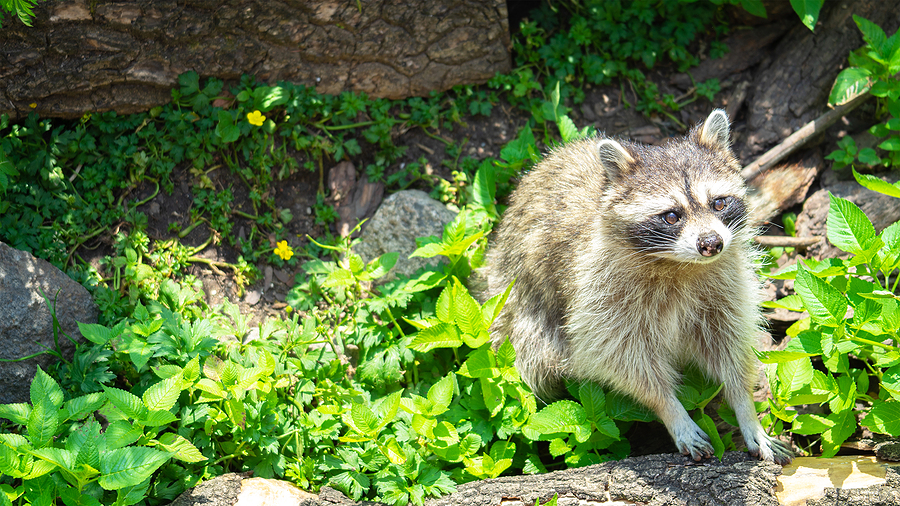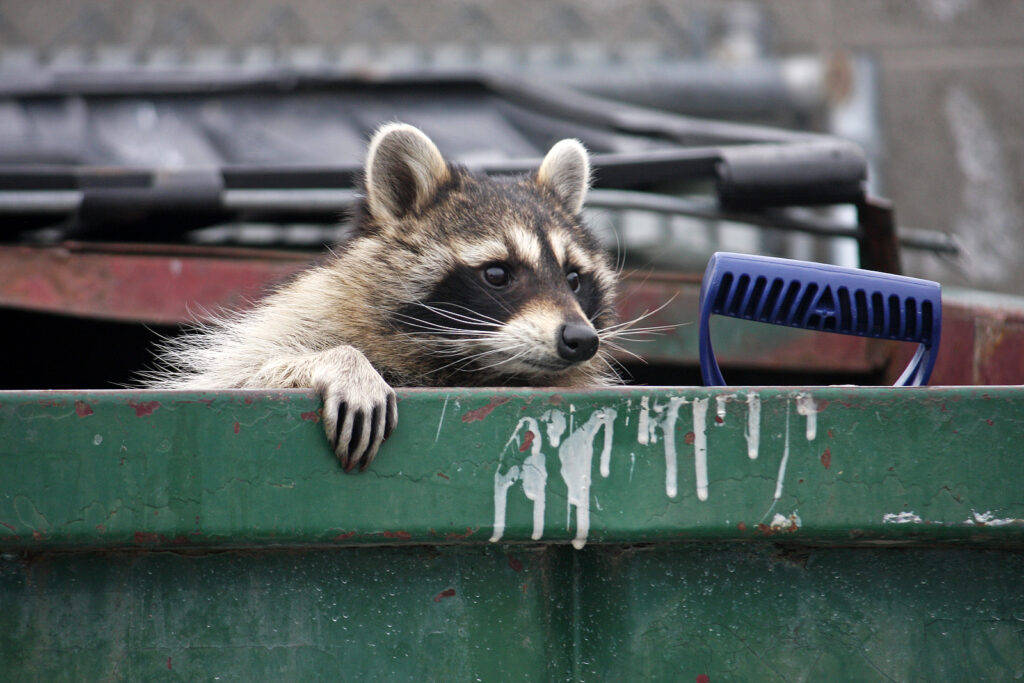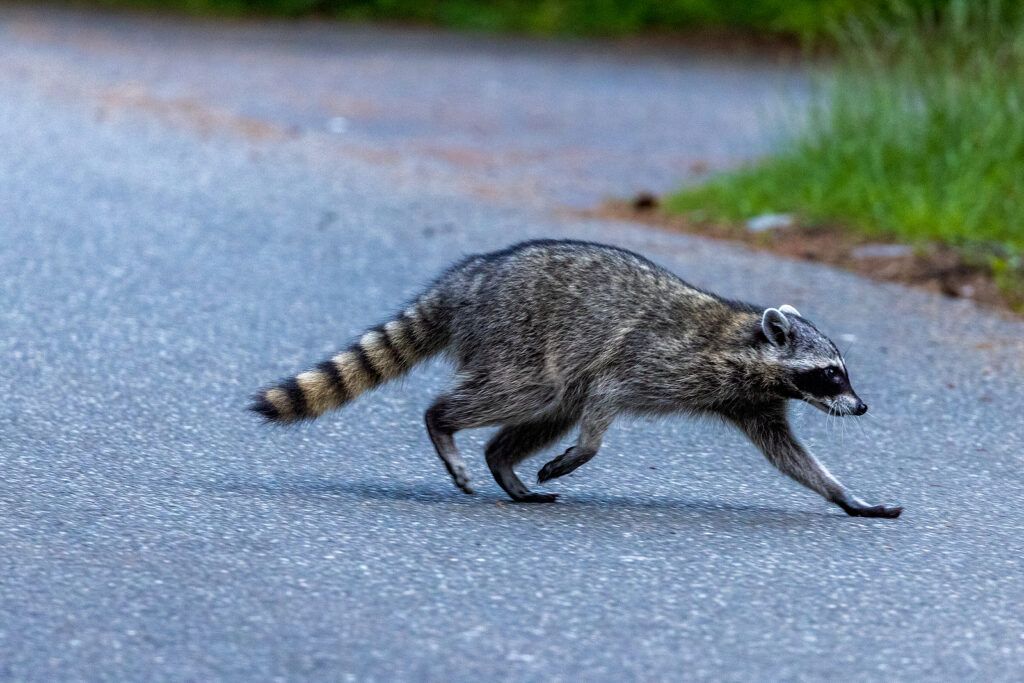Our animal kingdom embraces a long list of fascinating and beneficial critters. Depending on the region in which you live, you are likely to spot a variety wildlife, whether on car rides, hikes, picnics, rounds of golf, bike rides, fishing trips, or even a stroll through your neighborhood. Here in the Smoky Mountain region, one of the most predominant species of wildlife known to explore both woodlands and human territories are raccoons.
Raccoons are regularly spotted in rural and urban communities, but they also stick to the natural forests and wooded areas in the Smoky Mountains. When it comes to wild raccoons, namely raccoon sightings, there is much to beware of. The more knowledge you have about wild raccoons, the better you can react and navigate an encounter.
Continue reading to learn some general information about wild raccoons, some fun facts, and who to call for professional assistance and advice when it comes to raccoon control and preservation.

The Common Raccoon (Procyon Lotor)
Raccoons have many names and appellations. This is because they are found in several different regions of the United States, and exhibit marginally different features, habits, and lifestyles. Raccoons are part of the Procyon genus and scientifically referred to as Procyon Lotor, loosely meaning “dog-like”. In addition to this very formal title, these animals are also known as the Common Raccoon, North American Raccoon, and the Northern Raccoon.
Raccoon Species Around the World
In addition to these colloquial names, raccoons are also referred to by their habitat and behaviors. There are at least six known species of raccoon and various subspecies. They are highly adaptable mammals that can live in a variety of different climates all over the world, including Central, South and North America, Canada, Asia, Europe, and even the Caribbean. This variety leaves room for a lot of interesting names.
Other species of raccoons include, but are not limited to, the Ring-Tailed Raccoon, Upper Mississippi Valley Raccoon, the Eastern Raccoon, Ten Thousand Island Raccoon, the Crab-Eating Raccoon, the Tres Marias Raccoon, the Guadeloupe Raccoon, the Coati, the Cozumel Raccoon, and more. The differences among each species include size, weight, fur color, diet, behavior, and other identifiable and physical characteristics.
Local Raccoons in Tennessee
Raccoons are nocturnal animals, meaning they are active at night and rest during the day. During the night, raccoons generally hunt and forage for food. Although primarily nocturnal, they are known to venture out in the day from time to time for particular food sources. In the United States, these food sources are commonly turning out to be residential and urban garbage cans and dumpsters.
Raccoons travel and behave in colonies, usually consisting of their own kin. The beginning of the year has proven to be their breeding time, with a gestation period of about sixty five days or so. The males do not partake in raising the raccoon pups, so females separate following reproduction. Raising baby raccoons is not a terribly dangerous time period for female raccoons, mostly because raccoons have very few predators. This does not mean that they cannot be subjected to danger.
In certain parts of the world, animals such as coyotes, cougars, mountain lions, and bobcats, and more, will feed on wild raccoons. As natural instinct allows, raccoons are known to claw, bite, hiss, growl, and scream at anything threatening it. This defensive behavior is commonly seen in urban areas near humans and domesticated pets.
Raccoons are an Omnivorous Species Like Us
Raccoons are omnivorous so their diet can consist of everything from invertebrates to plant material. Depending on the time of year, habitat, and species of raccoon, food sources will differ. For example, in the late summer and autumn months, Northern raccoons are known to indulge in fruits, acorns, walnuts, and other seasonal foods that are rich in nutrients and calories. This better prepares them for their winter hibernation period. In the springtime and early summer months, raccoons dine on less favorable items, such as worms, insects, and other readily accessible invertebrates.
On top of these easy-to-obtain foodstuffs, raccoons will also eat fish, bird eggs, snakes, amphibians, and several other vertebrates, so long as they can reach them or catch them! Other regionally raccoon food preferences include crabs, lizards, plants, berries, crayfish, and even human food. This all depends on where they live and how accessible the food items are. Different species of raccoon display different habits when it comes to hunting and feeding.
Although not conclusively proven, raccoons are thought to wash their food before eating, also referred to as “dousing”. There are several theories to explain this behavior, however, most believe it is simply an archaic habit dating back to when raccoons mostly fed on shorelines and foraged food sources from watering holes. Other theories suggest that raccoons cannot produce an adequate amount of saliva to consume their food, so they must moisten it with water for sufficient digestion.
Raccoons are Losing Natural Habitats
Unfortunately, due to over-development and mass construction, some species of raccoon have been forced to live among humans in residential and urban areas. These raccoons have learned to adapt to this kind of living over the past fifty years. They use our municipal waste sites to forage food, as well as, home gardens, dumpsters, pet food bowls, and more. They use every opportunity they can find to gather and eat foodstuffs in our metropolitan areas.
For shelter, raccoons in suburban areas are known to use houses, buildings, attics, garages, sheds, and roofs, sewer drains, outside play sets, pet houses, hollowed trees, crawl spaces, porches, decks, and more. They are moderately intelligent mammals that can learn to overcome obstacles and remember certain tasks for up to three years! They can use their dexterous hands and claws to open gates, pick locks, dig holes, lift, push, and rip away anything in their way. This causes a lot of structural damage to homes and buildings in these municipal neighborhoods and areas.
Raccoon Removal and Control
When building and homeowners experience an animal infestation problem, it is important that they act fast. Structural damage, repairs, cleanup, and attacks are all potential consequences of a raccoon infestation. This is especially vital for families or buildings with small children. Wild raccoons can not only be defensive and protective of their clan, but they can also carry a plethora of communicable diseases, including Rabies, Canine Distemper, Leptospirosis, and more. To avoid a raccoon attack or contagious infection, it is crucial to remove raccoons as soon as you are aware they of their presence. Typically, a Nashville TN wildlife control company can be called out to diagnose the issue and facilitate a set of remedies to eliminate the threat.
Are you having trouble with nuisance raccoons around your Tennessee home or office building? Contact Smoky Wildlife Control at 615-610-0962 for raccoon removal and control service in Nashville and its surrounding counties. We serve residential and commercial properties.
Related Posts:
3 Effective Strategies For Keeping Raccoons Out of Your Trashcans
The Top 4 Methods to Get Rid of Raccoons
Make This Non-Lethal Animal Repellent Recipe to Get Rid of Raccoons



